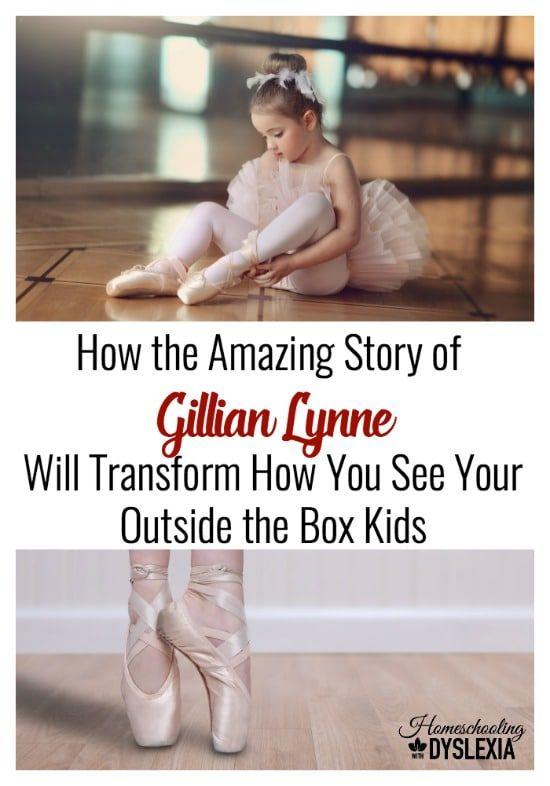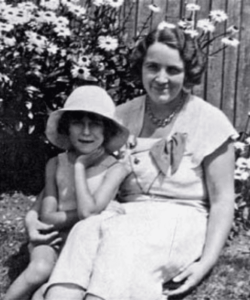How can the remarkable story of Gillian Lynne transform how parents see their outside the box kids?

The Remarkable Life of Gillian Lynne
Growing up in England in the 1930s, Gillian Lynne was 7-years old when her mother took her to the doctor because her school was concerned that she had a learning disorder.
Unable to sit still, Gillian had earned the nickname Wriggle Bottom. Gillian felt hopeless, her teachers were exasperated, and her mother was at the end of her tether. The idea of ADHD had not been born yet.
What happened at that doctor’s office radically changed Gillian’s life and provides a lesson for all parents who are seeking answers to how to raise their outside the box kids.
After listening to Gillian’s mother explain the teachers’ concerns about Gillian’s disruptive behavior, the doctor and Gillian’s mother stepped outside the office to speak privately. Before leaving the office, the doctor put some music on his tiny office radio.
From the hallway outside that office, Mrs. Lynne and the doctor peered in and observed Gillian jumping and twirling around the room, enraptured by the music.
The doctor turned to Mrs. Lynne and famously said, “There is nothing wrong with your child. She is a dancer.” After which he recommended Gillian be enrolled in dance school.
Can I just stop here for a minute and say, “Hallelujah!” I mean seriously, who was that doctor?
Gillian’s mom did enroll her in dance school about which Gillian remarked later, “Everyone was like me! They needed to move to be able to think. It was wonderful!”
Gillian went on to have a wonderful career at the Royal Ballet. She eventually graduated from the Royal Ballet School and met Andrew Lloyd Webber. She’s been responsible for some of the most successful theater productions in history such as Cats and Phantom of the Opera.
Not only has she given pleasure to millions, she’s a multimillionaire!

Gillian Lynne with her mother, Barbara, in 1932
Takeaways From the Story of Gillian Lynne
I am often encouraging homeschool parents to keep tabs on their expectations of their lives as homeschoolers, especially if they are teaching outside the box kids with dyslexia, dysgraphia, dyscalculia, and ADHD.
Our kids don’t do many things in the same way as the majority of kids who are more traditional learners. They learn at a different pace, with different methods, and often are interested in real life learning – easily becoming bored with traditional learning.
What would have happened if young Gillian Lynne grew up in our schools today? She surely would have exasperated her teachers and parents. However, it is likely that any medical help that she received would have resulted in testing, diagnosis, and medication.
I’m in NO WAY judging parents who go this route. Not a bit. Our family is right there with you.
What I am suggesting is to step back from our ideas of how things should be and ask ourselves how our expectations may be hindering our kids.
What does it mean to be educated? What are our goals in educating our kids? Why?
Are we teaching them so that they can achieve goals that make us look good as parents? Because for some reason, our kids seem to be born with all of these gifts and talents that are the polar opposite of our own!
How can we let the amazing success story of Gillian Lynne change the way that we look at education? How can we change our expectations for our kids?
If this post has moved you and you would like to learn more, read this series on Multiple Intelligences.
There is more than one way to be smart and if you’ve read to the bottom of this post, it is likely that you are related to someone who, like Gillian Lynne, marches to the beat of a different drum. Not a weaker drum with less value than others. A beautiful, unique song that by writing can bring them great fulfillment and bless many others.






I ask people this ALL THE TIME: What does it mean to be educated? What is the purpose of education? I’ve never seen anyone else address this fundamental question, yet ESPECIALLY when helping a child who is different from most others in some way that impacts their daily life, I think it ought to be among the top guiding principles as we prepare children for adult responsibilities. Kudos!
I was a problem child too. In my case it led to a 35 year career in IT. We need to abandon the one curriculum fits all mentality.
I homeschooled for 31 years–four children with ADHD, one of whom also has dysgraphia, and one with high-functioning Asperger’s. I have ADHD as well. This story of Gillian Lynne is way over-simplified and is a disservice to those of us who have suffered with ADHD all our lives and who have had to grit our teeth, clinch our fists, and muscle through the havoc wrought by unmanageable brains–only to still often be met with failure because of our inability to focus. Medication for ADHD is a lifesaver. Very few people with ADHD have the talent to become career dancers and choreographers and holding up one example like this as a viable alternative to medication is extremely unrealistic and hurtful. How many other children were in that dance class and in dance classes all across England? But only one had the talent and ability to make it to the big time. Where does this philosophy of non-medication leave the rest of them? Where does this leave the hyperactive child whose talents lie in other areas such as mathematics, science, history, mechanics, or linguistics? Where does this leave the person whose brain is hyper but whose body is not? It leaves us out in the cold, that’s where. ADHD is not about controlling our bodies; it is about controlling our brains. Medication for ADHD allows us to control our brains, to focus on our areas of interest and talent. It gives us the freedom to become those who create beauty in the world. It allows us to become educated in the field of our choice. What an amazing gift to give a child–or an adult!
Hi Jill. Thank you for taking the time to write. I actually agree with a lot of what you are saying as we are currently struggling with a child with profound ADHD. I shared the story of Gillian Lynne to give perspective to those who don’t understand ADHD at all. That people who have ADHD are wired differently. They need a different structure to their days to be successful. I will go back and edit the post to clarify because I don’t want people to think that if they just find their child’s talent, all will be okay.
Jill and Marianne, the point of this article IMO was to point out, in simple terms, that children don’t fit into cookie-cutter shapes and sizes. For too long, academia has been the yard-stick in the development of a child and vocational guidance has been flawed.